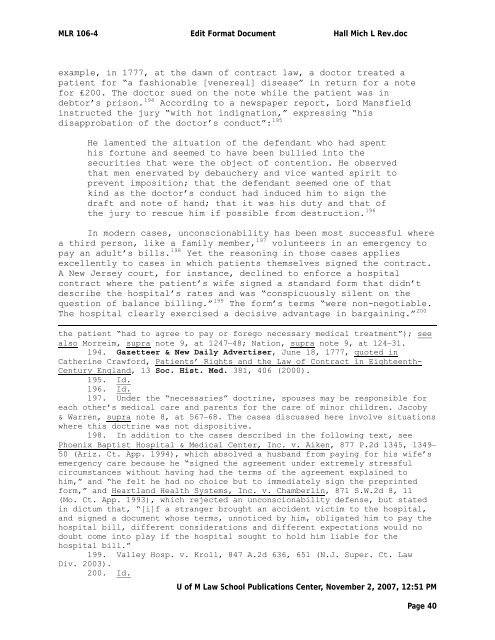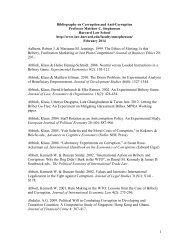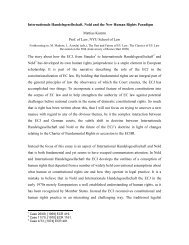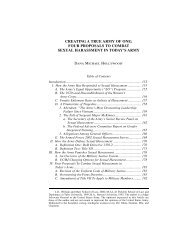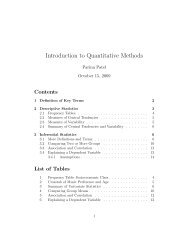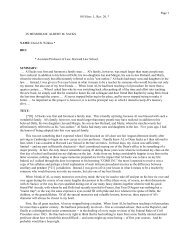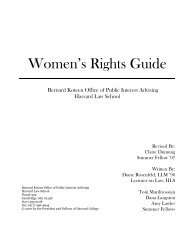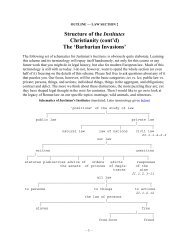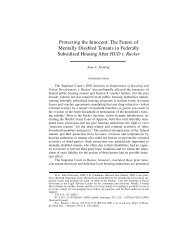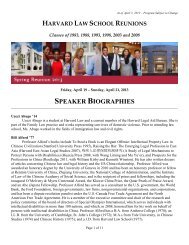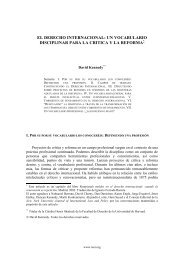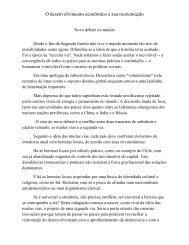Patients as Consumers - Harvard Law School
Patients as Consumers - Harvard Law School
Patients as Consumers - Harvard Law School
Create successful ePaper yourself
Turn your PDF publications into a flip-book with our unique Google optimized e-Paper software.
MLR 106-4 Edit Format Document Hall Mich L Rev.doc<br />
example, in 1777, at the dawn of contract law, a doctor treated a<br />
patient for “a f<strong>as</strong>hionable [venereal] dise<strong>as</strong>e” in return for a note<br />
for ₤200. The doctor sued on the note while the patient w<strong>as</strong> in<br />
debtor’s prison. 194 According to a newspaper report, Lord Mansfield<br />
instructed the jury “with hot indignation,” expressing “his<br />
disapprobation of the doctor’s conduct”: 195<br />
He lamented the situation of the defendant who had spent<br />
his fortune and seemed to have been bullied into the<br />
securities that were the object of contention. He observed<br />
that men enervated by debauchery and vice wanted spirit to<br />
prevent imposition; that the defendant seemed one of that<br />
kind <strong>as</strong> the doctor’s conduct had induced him to sign the<br />
draft and note of hand; that it w<strong>as</strong> his duty and that of<br />
the jury to rescue him if possible from destruction. 196<br />
In modern c<strong>as</strong>es, unconscionability h<strong>as</strong> been most successful where<br />
a third person, like a family member, 197 volunteers in an emergency to<br />
pay an adult’s bills. 198 Yet the re<strong>as</strong>oning in those c<strong>as</strong>es applies<br />
excellently to c<strong>as</strong>es in which patients themselves signed the contract.<br />
A New Jersey court, for instance, declined to enforce a hospital<br />
contract where the patient’s wife signed a standard form that didn’t<br />
describe the hospital’s rates and w<strong>as</strong> “conspicuously silent on the<br />
question of balance billing.” 199 The form’s terms “were non-negotiable.<br />
The hospital clearly exercised a decisive advantage in bargaining.” 200<br />
the patient “had to agree to pay or forego necessary medical treatment”); see<br />
also Morreim, supra note 9, at 1247–48; Nation, supra note 9, at 124–31.<br />
194. Gazetteer & New Daily Advertiser, June 18, 1777, quoted in<br />
Catherine Crawford, <strong>Patients</strong>’ Rights and the <strong>Law</strong> of Contract in Eighteenth-<br />
Century England, 13 Soc. Hist. Med. 381, 406 (2000).<br />
195. Id.<br />
196. Id.<br />
197. Under the “necessaries” doctrine, spouses may be responsible for<br />
each other’s medical care and parents for the care of minor children. Jacoby<br />
& Warren, supra note 8, at 567–68. The c<strong>as</strong>es discussed here involve situations<br />
where this doctrine w<strong>as</strong> not dispositive.<br />
198. In addition to the c<strong>as</strong>es described in the following text, see<br />
Phoenix Baptist Hospital & Medical Center, Inc. v. Aiken, 877 P.2d 1345, 1349–<br />
50 (Ariz. Ct. App. 1994), which absolved a husband from paying for his wife’s<br />
emergency care because he “signed the agreement under extremely stressful<br />
circumstances without having had the terms of the agreement explained to<br />
him,” and “he felt he had no choice but to immediately sign the preprinted<br />
form,” and Heartland Health Systems, Inc. v. Chamberlin, 871 S.W.2d 8, 11<br />
(Mo. Ct. App. 1993), which rejected an unconscionability defense, but stated<br />
in dictum that, “[i]f a stranger brought an accident victim to the hospital,<br />
and signed a document whose terms, unnoticed by him, obligated him to pay the<br />
hospital bill, different considerations and different expectations would no<br />
doubt come into play if the hospital sought to hold him liable for the<br />
hospital bill.”<br />
199. Valley Hosp. v. Kroll, 847 A.2d 636, 651 (N.J. Super. Ct. <strong>Law</strong><br />
Div. 2003).<br />
200. Id.<br />
U of M <strong>Law</strong> <strong>School</strong> Publications Center, November 2, 2007, 12:51 PM<br />
Page 40


